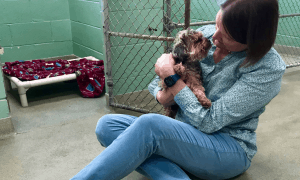“This post contains affiliate links, and I will be compensated if you make a purchase after clicking on my links.”
We all love our dogs like family, and all we want for them is to have a long, healthy, and happy life with us. Unfortunately, even with the best of care, dogs still tend to live shorter lives than us. To help your adorable furry friends to live longer, provide them with these 5 essentials for a long, healthy, blissful life.
- Regular veterinary care. To help your dog avoid preventable diseases through timely vaccines and treatment, routine veterinary check-ups are a must. This regular veterinary care should include mandated shots like protection against rabies, leptospirosis, parvovirus, kennel cough, distemper, and Lyme disease when necessary. Remember, it’s through early diagnosis and treatment that health issues can be managed easily, and are much less costly to cure.
- Proper dog training. Training is not merely about having a well-behaved pooch, although that’s crucial too. Whether your dog came to you as a little puppy, or as an adult adoptee, the very first thing you need to teach Fido is obedience to the most useful commands like “sit”, “stay”, “come”, and “leave it”. Never trust its previous master’s assurance that your new pet knows these basic commands- ensure that Fido acts upon them with YOU. A well-mannered, well-trained dog is less likely to run away, eat something dangerous, or ignore your commands that keep him out of harm’s way.
- Appropriate diet & exercise. Whether you’re feeding your pooch canned dog food or dry kibble, or giving him organic or raw foods, see to it that you always choose a well-balanced doggie diet appropriate for his age, energy level, and health condition. The same attention shall be given to the special treats and other foods that you feed him. Never overfeed your dog, and as much as possible, keep his treats to only 10% or less of his diet. If your pup has some sort of special dietary needs, your vet should provide you with suitable food and treat guidelines. With adequate exercise, at least 30 minutes every day, your dog is better able to maintain a healthy weight, avoiding the problems associated with dog obesity, with have healthier bones and joints, and will be much calmer and more relaxed inside the home.
- Plan ahead & be prepared. At one time or another, almost every dog, no matter how well trained or restrained, will find a way to break loose and go exploring. Ensure that whoever finds your pooch once he runs out of your house or pulls his leash from your hand, knows where to find you. Familiarize your dog with your neighbors, keep a collar and identification tag with a current phone number and address on your dog whenever he’s outside the home (even in the backyard!), and have him microchipped. This way, even if he loses his ID and other license tags, you can still be reunited with your dog once he’s found.
- Neutering or spaying. Spaying your female dog prior to her first heat cycle will almost completely safeguard her from developing breast cancer and uterine infection. Neutering your male dogs, on the other hand, will make them less difficult to live with since it can make them less likely to escape from your house, seek out a female in heat, pick a fight with other dogs, and encounter any sort of trouble that a loose pooch normally gets into.


Related Items:how to help your dog live longer, keeping your dog safe, living with a dog, microchipping your dog
Recommended for you
7 Comments






















Derek
says:I’ve a got a pooch that’s almost 18 and still enjoys life with the best of them, just a little slower and not hearing a darn thing. I agree with most of this except the vet part. I’ve avoided shots and vaccines most her life other than when I was forced. I don’t take vaccines every year nor should dogs. She’s seen the vet maybe 8 times her whole life so far and takes no daily drugs; unless beer counts. Vets, much like doctors are paid to push meds we don’t need. I also have 13 year old who looks 6 and sees the vet less.
Chel
says:I had a dog with heartworms and it was very sad the treatment. All my dogs are on heartworm monthly meds.
dexsmom
says:I can’t disagree more about vaccines. first vaccines and boosters are okay but yearly are contributing to bizarre cancers, and auto-immune diseases in dogs the likes of which we never saw before.
same with the use of chemical flea and heartworm. A well-known brand almost killed my yorkie.
please do some research pet owners.
Aside from bortedella what vaccines are people doing yearly? My dog’s have been every 3 years. I don’t do rabies because he was so allergic, and we are not in a high risk living situation.
Also wondering where the research is about the topical flea meds? Every dog owner I know uses these, (not from the supermarket!) and all diff ages/breeds of dogs. So far so good. So I am curious what has convinced you otherwise? Thanks.
Please come and “like” my fb page facebook.com/AdoptionRevolution
Help me get some shelter dogs seen and adopted.
dexsmom
says:around here they want to do: lepto, lyme, rabies, bortedella, parvo and distemper. I stopped getting yearly vaccines about 10 years ago when my dog was 5…he is now almost 16 and going strong.
My little yorkie almost died a day after getting Revolution. Vet told me she was poisoned and I said “yes, I know she was and you prescribed it”. I’ve done 100s of hours of research and have come to the conclusion that the chemicals in flea,and tick medicine, heartworm, etc are mostly unnecessary (research the lifecycle of heartworm and the real likelihood of your dog getting it and weigh against your dog’s lifestyle and risk factors). I look at it this way, how does the chemical insecticide know where the dog ends and the insect begins? if you have to practically wear a hazmat suit to put those little vials on your dog and wash your hands immediately and put in a bag and take it immediately to the garbage, there is a problem. It doesn’t belong on my dog.
god bless you for your work on rescuing dog. the world needs more people like you.
🙂
Shelley
says:I agree, vaccines can be harmful to pets. My Aussie at about 9 years old developed a reaction to one of the vaccines, fortunately my vet said it was okay to discontinue it. But when I took her in for surgery for skin cancer the vet nurse insisted we get that vaccine. The vet once again agreed with us and said it wasn’t necessary. My vet is more of an old time vet and believes that once the puppies get their initial vaccines and they get them regularly, that once they get older they don’t have to have as many. They have actually DECREASED the frequency of one of them.
I also prefer to use natural stuff and not the chemicals for things like fleas and ticks.
Some of the diseases just aren’t controllable though. I lost my cattle dog this spring to valley fever – no vaccine, nothing you can control because it is in the soil and unfortunately his was in the bones so even though we were treating it we were not successful.
John Lawshe
says:Don’t forget grooming and pest control. Flea and tick borne maladies are among the most common problems that dogs acquire. As for grooming, regular grooming will expose symptoms before problems can start. Keeping nails short is a MUST! Too long nails push the foot and ankle backwards and cause lameness, lifelong pain, and back problems.